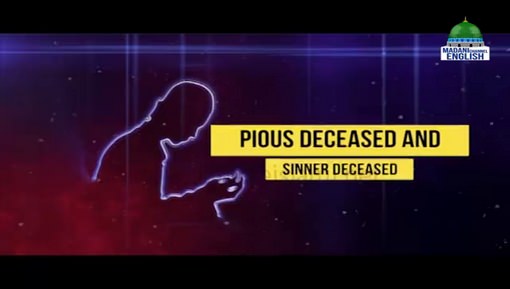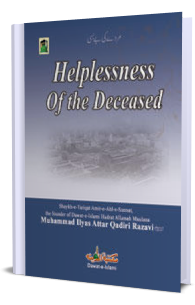The Creed of Islam
Benefitting the deceased
Episode 2
Maulana Muhammad Adnan Chishti Attari Madani
In last month’s edition, you read that Allah Almighty forgives the deceased if 40 or 100 Muslims participate in his or her funeral prayer. It was also mentioned that placing fresh branches on a grave brings comfort to the one buried inside it. Some of the actions and sayings of the Prophet صَلَّى الـلّٰـهُ عَلَيْهِ وَاٰلِهٖ وَسَلَّم are mentioned below in this regard as proof.
Placing branches on graves has been mentioned in various narrations by different companions. The works of the scholars of Hadith (muhaditheen) clearly state that the Prophet صَلَّى الـلّٰـهُ عَلَيْهِ وَاٰلِهٖ وَسَلَّم performed this action on multiple occasions. Proof that an action occurred once is sufficient to show that it is permissible and a rewardable act, but for it to occur several times further adds to its significance.
Furthermore, some of the companions رَضِیَ الـلّٰـهُ عَنْهُمَا and their students made a will to have branches placed on their graves, something the other companions and those from the generation after them (Tabi’een) acted upon. This proves that the act of placing branches on graves is not specific to the Prophet صَلَّى الـلّٰـهُ عَلَيْهِ وَاٰلِهٖ وَسَلَّم. Had this been the case, the companions would never have made a will for this, nor would they have acted upon it. The actions of the companions and the generation after them—alongside the fatwas of the scholars—establish the fact that the ummah has been acting upon this virtuous action for centuries.
A companion heard a voice from a grave
Sayyiduna Ya’la bin Murrah رَضِىَ الـلّٰـهُ عَـنْهُ reports that he passed by a cemetery with the Messenger of Allah صَلَّى الـلّٰـهُ عَلَيْهِ وَاٰلِهٖ وَسَلَّم and heard a cry from a grave. He told the Messenger of Allah صَلَّى الـلّٰـهُ عَلَيْهِ وَاٰلِهٖ وَسَلَّم , who asked, ‘Ya’la, did you really hear it?’ He replied, ‘Yes.’ The Prophet صَلَّى الـلّٰـهُ عَلَيْهِ وَاٰلِهٖ وَسَلَّم said: ‘This man is facing punishment for something that was not major.’ He asked, ‘For what reason?’, and the Prophet صَلَّى الـلّٰـهُ عَلَيْهِ وَاٰلِهٖ وَسَلَّم replied: ‘This man would create mischief, gossip about others and would not protect himself from being defiled by urine.’ The Prophet صَلَّى الـلّٰـهُ عَلَيْهِ وَاٰلِهٖ وَسَلَّم then asked for a twig from a date tree, split it into two parts and said: ‘اِغْرِسْ اِحْدَاهُمَا عِنْدَ رَاسِهٖ وَالْاُخْرَى عِنْدَ رِجْلَيْهِ ’, meaning, plant one part near his head and the other by his feet. The Prophet صَلَّى الـلّٰـهُ عَلَيْهِ وَاٰلِهٖ وَسَلَّم then said: ‘As long as they remain fresh, I hope his punishment is lessened.’[1]
Causes of punishment
It is mentioned in the Musannaf of Abd Al-Razzaq that the Prophet صَلَّى الـلّٰـهُ عَلَيْهِ وَاٰلِهٖ وَسَلَّم passed by two graves and said: ‘This is the grave of so-and-so. This is the grave of so-and-so.’ After mentioning the punishment they were facing, he placed a green branch on both graves. In this narration, the reason for one of them being punished is mentioned as follows: ‘وَاَمَّا الْآخَرُ فَكَانَ يَهْمِزُ النَّاسَ’, meaning, ‘As for the other, he would backbite the people.’[2]
Sayyiduna Qatadah and Sayyiduna Taa`us رَحِمَهُمُ الـلّٰـهُ narrate: ‘The Messenger of Allah صَلَّى الـلّٰـهُ عَلَيْهِ وَاٰلِهٖ وَسَلَّم passed by two graves whilst riding on a mule. The mule began moving to the side.’ Then, there is mention of fresh date tree twigs being placed on each grave.[3]
The first to bring a twig
Sayyiduna Abu Bakrah رَضِىَ الـلّٰـهُ عَـنْهُ narrates that he was travelling with the Prophet صَلَّى الـلّٰـهُ عَلَيْهِ وَاٰلِهٖ وَسَلَّم who was holding his hand whilst there was another man to his left. They suddenly arrived at two graves. The Prophet صَلَّى الـلّٰـهُ عَلَيْهِ وَاٰلِهٖ وَسَلَّم said: ‘These two are being punished, and it is not due to something major. Who from you will bring me a twig?’ Sayyiduna Abu Bakrah states: ‘I was the first to bring a twig.’ The Prophet صَلَّى الـلّٰـهُ عَلَيْهِ وَاٰلِهٖ وَسَلَّمsplit it into two and placed one on each grave.[4]
Passing by Jannah al-Baqi
Sayyiduna Abu Umamah رَضِىَ الـلّٰـهُ عَـنْهُ states that on a very hot day, the Prophet صَلَّى الـلّٰـهُ عَلَيْهِ وَاٰلِهٖ وَسَلَّم went to al-Baqi cemetery with a group of people behind him. When he passed by the cemetery, he came across two graves and asked, ‘Who did you bury here today?’ The people replied, ‘So-and-so.’ The Prophet صَلَّى الـلّٰـهُ عَلَيْهِ وَاٰلِهٖ وَسَلَّم said: ‘These two are being punished. [The reason for being punished is that] one of them would gossip about others, and the other did not protect himself from being defiled by urine.’ He then took a green twig, split it into two and placed a part on each grave. The companions asked: ‘يَانَبِیَّ اللّٰهِ،وَلِمَ فَعَلْتَ؟’, meaning, ‘O Messenger of Allah, why did you do this?’ The Prophet صَلَّى الـلّٰـهُ عَلَيْهِ وَاٰلِهٖ وَسَلَّمreplied: ‘لِيُخَفَّفَ عَنْهُمَا’, meaning, ‘So that their punishment is lessened.’[5]
Lessening the punishment of the grave
Sayyiduna Abu Hurayrah رَضِىَ الـلّٰـهُ عَـنْهُ narrates: ‘We were travelling with the Prophet صَلَّى الـلّٰـهُ عَلَيْهِ وَاٰلِهٖ وَسَلَّم and passed by two graves. The Messenger of Allah صَلَّى الـلّٰـهُ عَلَيْهِ وَاٰلِهٖ وَسَلَّمstopped, and so we stopped too. His face began to change, and his sleeves started shuddering. We asked: “O Messenger of Allah, what has happened to you?” He replied: “Can you hear what I am hearing?” We asked, “What is that [which you hear]?” He answered: “These two are being severely punished for a sin they could have easily avoided.” We asked: “O Messenger of Allah صَلَّى الـلّٰـهُ عَلَيْهِ وَاٰلِهٖ وَسَلَّم, which sins are the cause of their punishment?” He said: “One of them did not protect himself from being defiled by urine, and the other would harm people with his tongue and gossiped.” The Prophet صَلَّى الـلّٰـهُ عَلَيْهِ وَاٰلِهٖ وَسَلَّم then asked for two twigs from a date tree and placed one on each grave. We asked: “O Messenger of Allah, will this be of benefit to them?” He replied: “نَعَمْ، يُخَفَّفُ عَنْهُمَا مَا دَامَا رَطْبَتَيْنِ”, [meaning,] “Yes, their punishment will be reduced as long as these twigs remain fresh.”’[6]
The Prophet صَلَّى الـلّٰـهُ عَلَيْهِ وَاٰلِهٖ وَسَلَّم had a twig with him
Sayyiduna Abdullah Bin Umar رَضِیَ الـلّٰـهُ عَنْهُمَا states that the Prophet صَلَّى الـلّٰـهُ عَلَيْهِ وَاٰلِهٖ وَسَلَّم passed by some graves one day. He had a fresh twig with him, broke it into two and placed one on each grave. He was asked: ‘یَارَسُولَ الـلّٰـه لِمَ فَعَلْتَ ذَاكَ’, meaning, ‘O Messenger of Allah! Why did you do this?’ The Prophet صَلَّى الـلّٰـهُ عَلَيْهِ وَاٰلِهٖ وَسَلَّم replied: ‘لَنْ يُعَذَّبَا مَا دَامَتْ هَذِهِ رَطْبَةً’, meaning, the two people will not be punished as long as the twigs remain fresh. [7]
Fresh twigs were brought and placed on graves
Sayyiduna Jabir رَضِىَ الـلّٰـهُ عَـنْهُ narrates: ‘We were travelling with the Prophet صَلَّى الـلّٰـهُ عَلَيْهِ وَاٰلِهٖ وَسَلَّمand came across two graves in which those inside were being punished. Explaining the reason for them being punished, the Prophet صَلَّى الـلّٰـهُ عَلَيْهِ وَاٰلِهٖ وَسَلَّمsaid: “One is being punished because he would backbite, and the other because of [not saving himself from being defiled by] urine.” The Prophet صَلَّى الـلّٰـهُ عَلَيْهِ وَاٰلِهٖ وَسَلَّم asked for a fresh twig and broke it into two pieces. He then placed one part on each grave and said, “I am hopeful that their punishment will be reduced for as long as the twigs do not become dry.”’ [8]
Placing a twig in the direction of the deceased’s head
As evident from the following words, it is clear that the Prophet صَلَّى الـلّٰـهُ عَلَيْهِ وَاٰلِهٖ وَسَلَّم broke a twig into two pieces and placed them on the grave towards the deceased’s head ‘ثُمَّ غَرَزَ عِنْدَ رَأْسِ كُلِّ وَاحِدٍ مِنْهُمَا قِطْعَةً.’[9]
Those in surrounding graves inform of the punishment
Sayyiduna Ibrahim al-Nakh’ee رَحْمَةُ الـلّٰـهِ عَـلَيْـه narrates that two people were being punished in their graves. Those buried near the two being punished informed the Prophet صَلَّى الـلّٰـهُ عَلَيْهِ وَاٰلِهٖ وَسَلَّم of this, to which he said: ‘خُذُوا كُرْبَتَيْنِ وَاجْعَلُوهُمَا فِی قُبُورِهِمَا يُرَفَّهُ عَنْهُمَا الْعَذَابُ مَا لَمْ يَيْبَسَا’, meaning: ‘Take two twigs from a date tree and place them on their graves. As long as they do not become dry, their punishment will be lessened.’ Sayyiduna Ibrahim al-Nakh’ee رَحْمَةُ الـلّٰـهِ عَـلَيْه states: ‘The Prophet صَلَّى الـلّٰـهُ عَلَيْهِ وَاٰلِهٖ وَسَلَّم was asked as to why they were being punished. He صَلَّى الـلّٰـهُ عَلَيْهِ وَاٰلِهٖ وَسَلَّم said: ”Because of talebearing and [not saving oneself from being defiled by] urine.”[10]
One of the graves belonged to a woman
In the narration mentioned by Sayyiduna Imam al-Bayhaqi رَحْمَةُ الـلّٰـهِ عَـلَيْـه, one of the graves belonged to a man who did not protect himself from drops of urine. The other grave belonged to a woman who was punished because she would backbite others.[11]
Why the branch of a date tree?
Imam Siraaj al-Deen, Abu Hafs Umar Bin Ali al-Shaafi’i, famously known as Ibn al-Mulaqqin رَحْمَةُ الـلّٰـهِ عَـلَيْـه, wrote a commentary on al-Bukhari. He writes that the Prophet صَلَّى الـلّٰـهُ عَلَيْهِ وَاٰلِهٖ وَسَلَّم specifically chose a date tree due to the following:
1. From amongst the fruit bearing trees, this tree has the longest lifespan. Therefore, the reduction in punishment will also last a long time.
2. This is a pure tree; it is referred to in the Quran as شَجَرَةٌ طَيِّبَةٌ.
3. The Prophet صَلَّى الـلّٰـهُ عَلَيْهِ وَاٰلِهٖ وَسَلَّم said that tree is similar to a believer. It has also been said that this tree was created from the leftover clay that was used to create Prophet Adam عَـلَيْـهِ الـسَّـلاَم. [12]
May Allah Almighty protect every Muslim from the punishment of the grave and the Day of Resurrection.
اٰمِیْن بِجَاہِ النَّبِیِّ الْاَمِیْن صَلَّی اللہ تَعَالٰی عَلَیْہِ وَاٰلہٖ وَسَلَّم
[1] Dalaail Al-Nubuwwah lil-Bayhaqi, vol. 7, p. 42
[2] Musannaf Abdur Razzaq, vol. 3, p. 394, Hadith 6,783
[3] Musannaf Abdur Razzaq, vol. 3, p. 394, Hadith 6,782
[4] Musnad Imam Ahmad, vol. 37, p. 7, Hadith 20,373
[5] Musnad Ahmad, vol. 36, p. 625, Hadith 22,292
[6] Sahih Ibn Hibaan, vol. 2, p. 96, Hadith 821
[7] al-Mu’jam al-Awsat, vol. 3, p. 221 Hadith 4,394
[8] Musnad Abu Ya’la, vol. 2, p. 290, Hadith 2,051
[9] al-Muntakhab min Musnad ‘Abd Bin Humayd, p. 210, Hadith 620
[10] Ithbaat Azaab al-Qabr li al-Bayhaqi, p. 136, Hadith 237
[11] Ithbaat Azaab al-Qabr li al-Bayhaqi, p. 87, Hadith 122
[12] al-Tawdih by Ibn al-Mullaqin, vol. 10, p. 120, Hadith 1361














Comments